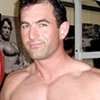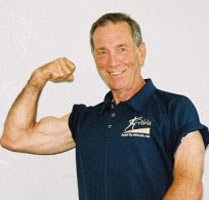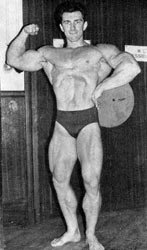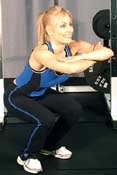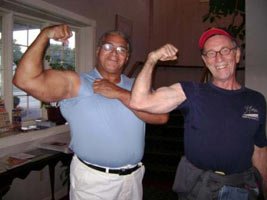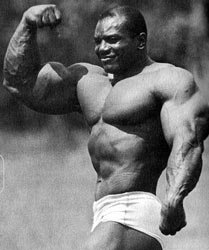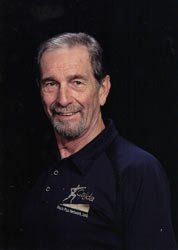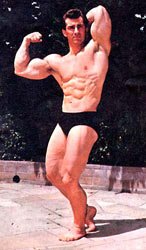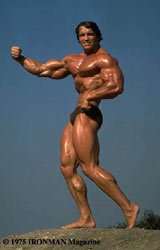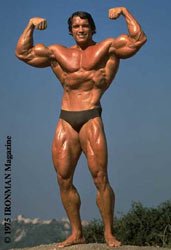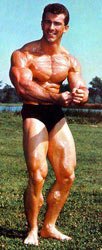| Part 1 | Part 2 |
| Article Summary: |
The 1960's proved a pivotal time for bodybuilding with the emergence of major champions Arnold Schwarzenegger and Sergio Oliva, and its greater public acceptance as a desirable way to shape the body and improve health due to the enhanced profile it was gaining by the day.
As the benefits of a well-developed physique became more widely known and bodybuilding - as sport and recreation - increasingly gained many devoted adherents, many of its fellowship worked hard to build their bodies to perfection, to take their physical goals as far as humanly possible.
One such man was Bob Gajda, in the early '60s a young basketball, football and baseball player who, much to his coach's dismay, used weight training to enhance his athletic performance. When his physique began developing, and his performance improved, rather than regressed as his coach had predicted, Bob instantly knew that a carefully designed weights program, performed properly, could benefit the sporting masses.
Ever since, Bob made it his mission to become knowledgeable in the areas of anatomy, physiology and sports performance and, thus equipped, has enabled thousands of athletes to reach peak performance. Along the way he became one of these great athletes himself - a Mr. America no less.
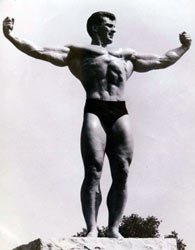
 Click Image To Enlarge.
Click Image To Enlarge.
Bob Instantly Knew That A Carefully Designed Weights Program,
Performed Properly, Could Benefit The Sporting Masses.
After placing 11th in 1964 and second the following year, Bob was, as was expected under the AAU system at the time, the favorite to win the 1966 AAU Mr. America title. With a ripped to shreds physique and phenomenal balance between all muscle groups, Bob did just that to take his place among a legion of top champions who had gained such an honor since the contest's inception in 1938.
Throughout his competitive career, which ended with first place at the 1966 FICH Mr. Universe, Bob worked closely with several major bodybuilding champions including multi-Mr. Olympia winner Sergio Oliva.
A passionate advocate for and preacher of the virtues of weight training for health, fitness and character development, Bob also developed Chicago's Duncan YMCA gym and played a major role in establishing the Chicago bodybuilding scene.
What makes Bob's story an interesting one, other than the training concepts he developed and popularized, and the genesis and fruition of his own bodybuilding career as both competitor and trainer, is the experiences he has had along the way.
From conversations and verbal battles with bodybuilding Godfather Joe Weider to his role as fitness advisor to the Chicago Mob and his tenure as training partner to, and eventual defeat of, Sergio Oliva, Bob has seen and done much in bodybuilding.
In the following interview, Bob shares his training concepts, bodybuilding experiences and controversial insights into many areas of the iron game.

[ Q ] How did you get started in bodybuilding Bob?
-
Essentially I was a young athlete. I played
basketball,
baseball and
football. So you had these park district teams where you had the Junior Bear's where we would play at halftime at the
Bear's games.
But at that time I was a small guy so I took the Jowett course, took the Charles Atlas course and all the others and then I kind of got involved with the barbells and dumbbells.
And it was against my coach's wishes because they believed at the time that you would "get musclebound". That was the quote used. He said he would allow his linemen to do some exercises with weights, but not the quarterback. So I used to do it on the sneak... and my coach caught me.
He took me to the church down the block and made me promise in front of the Holy Mother that I wouldn't lift weights. It is not that I lied because I said I would not (lift weights) at home, because that is where I had them. So I used to sneak over to the park district gym.
At the end of the summer the coach put his arm around me and said, "take a look at this guy, he is throwing ten yards further, he is bigger, faster and stronger and he did it with callisthenics." And all the guys were laughing. They knew I lifted weights. So that's how I started with weights as a supplement to my sporting life.

[ Q ] Good story. This underscores the importance of weight training for sporting purposes.
-
It also underscores the change in the different beliefs. Alfred Wiesen said in his book, Education, that there is a pendulum that swings from one side of the road to the other that drops its contents into a hole.
So now you have this other extreme where you have these guys who are so involved with the weights that maybe you have too much and some of that belief that they are getting slower may be coming true because they are not guided by people who really understand the performance aspects.

[ Q ] Are you referring to people who more train for size and strength at the expense of function?
-
Yes. Years ago I trained a very famous American running back,
Rocky Bleier, and I changed his training from the
powerlifting kind to the more functional where you are doing more stuff like
jump squats and then he went onto make history when he beat out
Frenchy Fuqua years ago. He put it in his book that he was trying to be a powerlifter but it was not the right idea for him; he needed to get the springs working in his legs.
-
That is another interesting story in how we have changed in attitude or viewpoint and perception on how we do training now.
Strength training: it is an equal part of fitness - there is no doubt about it.

[ Q ] How much of an emphasis would you place on strength training for a basketball player wanting to improve their on-court performance? What percentage of training would be oriented toward weights?
-
Well, when I am talking weights, I am talking about controlling your own body mass. Leverage systems work differently. A tall guy may have to work on balance a lot more so we would be working on one-legged movements:
one-legged squats, one-legged
jump squats as a really good way if that is where they are weak.
They can't hit 90 degrees and you don't expect them to so a good strong three quarter squat for jumping ability is best. The key to jumping is to train for these dimensions by understanding that there is a stability strength that has to be equalized in developing this idea of mobility strength. You can use that for weights or for machines.
We are living in that age now where we look at machine and say, "What is the value in this?" Well there is nothing that has more value than your free bodyweight. That is the only free weight that you have. You have to pay for dumbbells; you have to pay for barbells and machines. So that is the only one you have and that is the one you have the least control over.
Related Basketball Articles:
-
Over the years I have seen guys - when you are talking function versus form - and all these other factors included, you have got
strength as the major indicator and we are kind of losing that now I think.

[ Q ] I have just finished reading your PHA paper and found it very interesting and insightful. I would like you to explain some of the concepts contained within very soon. But firstly, in the introduction it says that Joe Weider actually condemned PHA as being a primitive training practice. What would you say in rebuttal to this?
-
And later he called it "the Weider Staggered Sets Principal". The way I presented it kind of scared him and he asked Gordon Venables to write something on it. And what that involved was an argument on "what is science?"
The only way (Gordon) could approach (the writing of the article) was through science but (Joe) Weider told him to get off that because of a call I made to him (Joe).
I responded by saying that we were in a war right now and that this guy was making stuff up about me not being a scientist. So Joe told him to leave the subject alone, but then he came back and said he approved of it, but named it "Staggered Sets".
That was at a time when Joe Weider's research clinic was in his broom closet. That is a true story. The door to Weider's "research clinic" complete with sign, led directly into a broom closet. It was known all over the city.
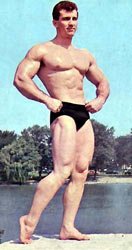
 Click Image To Enlarge.
Click Image To Enlarge.
We Were In A War Right Now And That This
Guy Was Making Stuff Up About Me Not Being A Scientist.

[ Q ] Tell me more about your dealings with Joe Weider.
-
Well it is interesting. When I did the WBBG Hall of Fame awards (in 2007) I was with
Harold Poole and we were all together just telling stories about Joe Weider, which is kind of a fun thing to do. You could do that with Bob Hoffman too. They are great leaders in terms of what they did.
I was once with Weider in his office talking and we were looking out the window and Harold Poole was down there with a bunch of guys in the back of the warehouse and they were loading up the back of somebodies car.
I said to Joe, "I thought your office was closed." And he said "Yes we are closed, what do you mean?" And I said, "Well those guys are still selling products down there." He said, "Oh that is Harold, he's stealing." I said, "What do you mean stealing? Don't you say anything to him; that he shouldn't steal?" He said, "Well that shows me the guy has got incentive. We don't pay him enough money for what he does so I like to let him think he's getting away with it."
Well I told that story and Harold Poole said, "You know what, that's a true story, he didn't pay me enough." And that's the way it was. See, Weider would write it off on his taxes later. But they ran him out of New Jersey for the deal he was involved in. Oh the history on him. I know somebody recently wrote a book on it but I would like to know the true history. Tell the truth about why he had to move out (of New Jersey).

[ Q ] Just what was the real situation as far as your understanding is concerned? I understand Joe Weider went bankrupt.
-
How many times was he bankrupt? I mean that was a regular thing with him (Weider). He used to bankrupt his
magazine every edition and it happened for years. He did stuff that was off the wall. He would change the magazines' names. He just kept changing the names because he could never give you 12 issues.
What he ever printed was ten issues and he worked that and changed the name after the tenth issue. Follow the history of Weider and you will see that. Muscle Power was his main stay because he had Earle Liederman doing it for him.
Weider used to say to me, "Gajda, you are wasting your life with all these Christian organizations. You come with me. You don't know how to make money. You have to beg for money from people to make it happen. Come with me and I will show you how to make money."
I never was interested in the financial side of it. That's why I had the YMCA. Remember I had a volunteer organization, competing with York Pennsylvania. But it was sports competition. I was never a Weider guy. I would probably be more married to the York or the Lurie group. I wrote for Strength and Health and Ironman.

[ Q ] How did you find Joe Weider as a person?
-
He was a very, very bright guy. We used to discuss Nietzsche (19th Century German Philosopher and Philologist). Minichiello (Tom - former owner of New York's Mid City Gym) also said that Joe was the only New Jersey Jew that read Goebbels (Hitler's Minister of Propaganda). He did. And he (Goebbels) said, "Tell the lie over and over and people will believe it as the truth." And I see this. He (Joe) just took it in.
I remember we were once backstage and he (Joe Weider) was scalding Harold Poole and ordering him to do a particular pose for his magazine. But (Joe) would take photos of these guys and use them for ten years and they (the athlete) would get no money for them. That was the game that I saw and said to myself, "I got to get out of this and move into academia."
| CLASSIC BODYBUILDING QUOTE | |
|

[ Q ] What particular aspect of Nietzschean philosophy did Joe tend to discuss most? 
-
Joe used Nietzsche's terminology: "will to power". This is so Nazi when you think about it and people all said that. But Goebbels would argue that he wasn't a Nazi. It's that idea of power that comes from Goebbels Nietzschean superman philosophy, the philosophy that resurrected the whole German Empire. Hitler - and I don't want to make him a hero - was secondary to Goebbels.
Man and superman: This is where the Third Reich got its symbolism. I wouldn't blame Nietzsche for that; he was just the philosopher. But it shows you what you can do with language. I often have a mistrust of language especially when it comes to bodybuilding.
 |
Editor's Note: Norwegian author Knut Hamsun (who died in 1952) was among the greatest European writers of the twentieth century, winning the Nobel Prize for literature in 1921. Hamsun was much lauded by Nazi Minister of Propaganda Joseph Goebbels for the National Socialist spirit and world view which underlay his work. |
 |
 |
||
The main character in Hamsun's idealistic novel, Growth of the Soil, for which he won his Nobel Prize, reflected Hamsun's faith in the coming man of Europe: a Nietzschean superman embodying the best racial type who, acting in accordance with nature's higher purpose, would lead the race to unprecedented levels of greatness. Goebbels based much of his anti-Jew propaganda on this Nietzschean superman, or for the purposes of Hitler's eugenic ideal, a super, master Aryan race.

[ Q ] Many respect Joe for his role in the progression and promotion of bodybuilding and fitness. What did you like most about Joe? 
-
Weider to me is a great marketeer; I don't know anybody better. You have PT Barnum and you can put Joe up there on that list. For some people that is a putdown. But Joe engineered himself into an ideal situation. And was in the prime spot. He didn't have any competition when Hoffman went and
Dan Lurie retired.
I would love to see Lurie back. We need another 90-year-old guy telling us what to do. God bless him. He is good for the industry. There was competition between Weider and Lurie and that was another reason Weider had to get out of town. That (New Jersey) was Lurie's turf. So Weider had to leave town for a lot of reasons. Dan Lurie was the guy that was behind the scenes and didn't get all the credit he deserved.

[ Q ] I understand there was some bad blood between Joe Weider and Dan Lurie.
-
Yes, but that stuff is fun too. The guys calling each other names; they have a right to, they are the big guys. I have nothing but respect for Joe.
| RELATED ARTICLE | |||
|
Author: David Robson |

[ Q ] Joe was supposedly responsible for formulating the Weider principals. What do you know about this?
-
No, he railroaded all of that. I caught him on so many things. I mean "Giant Sets" and all that stuff. No, that had nothing to do with him. But he, all of a sudden, incorporated all of these into his system. He renamed my sequence of training "Staggered Sets". And there were all these other systems there and he just incorporated those things. I mean guys are still arguing about certain things: do you do cheat curls or keep it strict?

[ Q ] Based on what has been said and what you have alluded to here, Weider seems to have appropriated many existing bodybuilding principals. 
-
And to his advantage, but I think the record shows he screwed a lot of guys. Just ask
Dave Draper what he thinks of Joe Weider. They tolerate each other but there is no love lost. You ask
Sergio Oliva about Joe Weider. Sergio has respect for Dan Lurie. Now Dan is the guy we should all pull behind as our senior delegate.
You see Joe didn't have a moral structure. Too me, as a YMCA Christian guy, I wasn't there in the bodybuilding and fitness scene for that reason. If money came it would be there to help the kids. You look at all my pictures from that time and you will see that I had Duncan YMCA T-shirts on. Not Gold's Gym or anything competitive like that; just to give the kids at the Y pride. If you look at Oliva he would be wearing Duncan Y shirts.

[ Q ] I would like to begin talking about your bodybuilding career Bob. Who were some of your earlier influences when you began in the sport?
-
Well my influences were the guys who had a combination of strength and muscle, guys like John Grimek. And of course everybody adored
Steve Reeves. He made bodybuilding respectable, he was the first, and then you had
Arnold.
There was the Hercules movies and of course Reg Park. Reg Park passed away recently and he was the kind of guy you could really look up to. Both him and Bill Pearl would be my idols - just what they had built and the sensibility of their training. Not crazy like now, good Lord.

[ Q ] What are your thoughts on Reg Park?
-
Well I never met him but from what I read about him he was a well respected man and as strong as a horse. There are guys now who couldn't lift their mother.
| RELATED ARTICLE | |||
|
Author: David Robson |

[ Q ] Marvin Eder was another very strong guy who once trained with Reg Park.
-
Yes very much so. Now you are into strength athletes. Their strength was the factor and to me that was the key and the key measure. You see if the strength is going up, guess what? The muscle is growing. That to me is the obvious thing. Guys nowadays puff it up with all that fluid and have the extracellular fluid hanging in their muscle, all stored up in the fascia and they think that is good.

[ Q ] You feel they are basically just pumping up?
-
And scarring. That stuff begins to congest in the joints and those guys are all aching these days. They just had an award ceremony for old time bodybuilders and those guys were all functioning well. Their joints were all working good and they were all in their 50's and 60's. One guy came here recently for my birthday party: he was 84 years old and could do 18
chin-ups. I'm getting up there (in age) myself so I have to respect that.

[ Q ] I saw photos of you from the event you describe (the 2007 WBBG Hall of Fame awards) and you were in great shape.
-
Well yes. I guess when you are working with kids showing them how to do things. They can't believe it that the old guy can do it.

[ Q ] Of course you wouldn't think of yourself as an old guy.
-
No, but I kind of had that realization after I had an accident and I lay there in the bed and said, "Oh my God, I'm getting old." I would have been out of there in four days when I was younger but it took me a few weeks (to
recover).

[ Q ] Do you still weight train today?
-
Yes but sensibly, not the nuts stuff. You don't have to go crazy. What are you looking for? Do you want the muscle to grow? If yes, then it has to be stimulated - if you are pumping it beyond belief then it gets smaller. It is a pump thing. These guys today have developed an ability to expand the tape measure but when you measure it (a muscle) cold it doesn't do it.
Strength is your best indicator.

[ Q ] And your early influences where the stronger bodybuilders?
-
Yes. I mean
Marvin Eder is revered. Also the iron game guys from around here (Chicago) love the parallel bar
dips and the
chins and stuff like that, with the weights on. But Eder was just so thick with muscle and they didn't think about the steroids at that point. They had them though.
All of us Golden Age guys are disillusioned over how drugs have become a big part of bodybuilding. It is just crazy. We did it all for health and that was why we began. We were so much against drugs. But people were initially against training. It was like the Frankenstein Syndrome.
| RELATED ARTICLE | |||
|
Author: David Robson |
-
You were not supposed to touch what God made or modify it at all. You were modifying it because you were doing weights. Now the kids are sticking sh!t in their muscles. That is goofy, putting oil into your muscle. I had one person who came to me asking what he could do about the plate he had inserted into his biceps, which was sliding out into his armpit every time he did a
bench press. I told him to put a girdle on it.

[ Q ] And there is the synthol that people are injecting nowadays.
-
Oh my god, that is the latest. I watched a program on the Education Channel recently about the man with the exploding arms (
Greg Valentino). It was mind-boggling. Nobody would really sit there and watch it but that is what those guys are doing: they are creating inflammation in the muscle. And this guy is laughing. But this is the Botox world we are living in.

[ Q ] And this is what some people not familiar with the sport associate with bodybuilding.
-
And that is the sad thing. Bodybuilding is a beautiful thing; it should be the foundation for so much in sport, everybody should benefit from it, we should have honest to God truth and not bullsh!t, which you get with this bomb and blitz stuff. It is crazy; you don't want to hurt yourself, you want to know how to control things. Do them in correct form like the Russians said. Assume correct form.

[ Q ] That's all very noble but you have people representing bodybuilding who do not adopt the same philosophy.
-
You have to blame the advertisers. They are supporting this stuff. My friend is the editor and owner of
Ironman magazine (John Balik). I said to him, "What are you doing, you are just going cheesecake and you have 80 percent of your magazine being advertisements; can you cut them back?" He told me that that's the way it is going in the industry now. You have to do that.
And half those magazines we get for nothing in the mail - All the Weider ones but not the Rodale Press ones. And that is the one (Rodale) that sets the standard for the industry right now. The other magazines just copy off them.
Anything you see, something new on vitamin C or this or that, comes directly out of there. And people are looking for the truth. They want to see honest presentation on stuff. There is enough good stuff out there. You look at guys like Reg Park: it is all sensible training and eating.

[ Q ] Their philosophy could all be summarized in one word: sensible.
-
I like it. Let's go with that shall we?

[ Q ] When you began competing in the Mr. America, the judging was completely different compared to the way it is today. The judges would question you about your athletic background and this would be scored. Tell me more about that.
-
There were points given. You had to be really goofy if you didn't get the athletic points. There were guys out there who had these terrific torsos and stuff, but had nothing else other than the fact they lifted weights. The idea as it was expressed to me back then, and I followed it to the letter, was that you had to demonstrate something sporting other than bodybuilding.
Weightlifting was an acceptable sport. The idea was you could show off that you had strength in addition to a beautiful body. I like it and think it is a good one; it is a shame we don't have it anymore.
I beat out the guy in the Mr. Chicago with the press. We determined who was the strongest guy. They weighed me and I beat him in the press. You know what? That was real competition. And that was the way the rules were and you weren't supposed to be making dough out of it. Now that it has changed to professional you got a different story.

[ Q ] Was your physique better than the guy you beat on the press?
-
We were equal. But you were not just interested in how judges judged the body. You wanted to see it (the body) in action. When I won the FICH Mr. Universe one of the key factors was that my lifting was so good. I was national caliber as a lifter.
Think about how that changes your training. You had to do at least one weightlifting meet in total. You had to do the qualifying total and that was worth 25 points. It was a factor. Some guys did it, some guys didn't.
At the time there was also a prejudice factor. The idea that there was no black Mr. America at that point; Harold Poole who preceded me didn't win it. They used other criteria and Harold at the time had a lot of stuttering problems.
| RELATED ARTICLE | |||
|
Author: David Robson |
-
The idea was that the guy has to express himself well to best represent the sport and nobody knows the difference between one muscle-head and the other guy. And he had a speech impediment. Was it prejudiced? Sure it was.

[ Q ] Harold was a phenomenal athlete and bodybuilder nonetheless.
-
Yes he was and he did have the athletic points. He was right there. And he also won the Most Muscular. But you are looking at the guy who beat him and he is an attorney now; he was a college graduate; Joe Abbenda.
Joe Abbenda was a great influence in terms of bodybuilding. He never did anything stupid. The guy is a famous attorney now and he was a schoolteacher at the time. Who would you vote for?

[ Q ] I would vote for Harold who had the superior physique in my view and was more muscular. But rules are rules.
-
But the idea was the Most Muscular was a special dimension so the guys would win that. Nowadays the Most Muscular is the criteria.

[ Q ] Is having an interview component placing bodybuilding into the category of beauty contest?
-
Well how can you be a winner and a spectator? You have to be an active part of the sport you represent. Whether you like it or not, you listen to the
football players and some of them you can hardly understand. But they still have to be able to talk.
How can you have a sport without someone who can speak? I remember Tommy Johnson who used sign language. He couldn't talk but he could write and demonstrate and show what he was all about so he was a viable contestant.

[ Q ] I would like to take you back to the 1966 Mr. America where Sergio Oliva placed second to you. Was the outcome of this contest in any way controversial in your view?
-
I think the point there, if there is a point to be made, is that he couldn't speak English. You have a Mr. America but he can't speak English? I love Sergio; we were
training partners. But that is the Mr. America you are talking about. The question is, what happened to Sergio afterwards? There were guys that would contend that I was the best on the day depending on how you cut the mustard.

[ Q ] Why did you quit bodybuilding after your 1966 Mr. America victory?
-
It was getting crazy at the time and I was running YMCA weight-training programs, getting kids involved in the sport and improving their self-esteem. And that is where my heart was - not into the money.
Joe Weider used to come to town and take me to dinner and he would say, "Gajda, you are the smartest bodybuilder that ever lived to date and yet you don't know how to make money." I said. "I don't care about money, I am a YMCA guy." I was at that time of life also a schoolteacher and those kinds of things mold your character.

[ Q ] You could have made money working for the Weider magazines.
-
Yes, but there is one thing I never permitted and that was the editing of my stuff. I didn't like that. Honest to God, I could not just sit there and let someone put my name on something I did not write. After Sergio began winning, how many articles did he write? There were a lot of them but how many did he write?
| RELATED ARTICLE | |||
|
Author: David Robson |

[ Q ] Did you have much to do with Arnold?
-
Arnold is one of the smartest guys I have ever seen in my life - there is no one like him anywhere - but when I beat him in East Berlin he was 18 or 19 years old, and Leopold was his trainer.
Leopold I had great respect for; he had a wonderful torso and he could speak English beautifully. We would go out for dinner often when I was in East Germany and talk about Arnold's training and how he was going to be the greatest that ever was and that he was willing to do it.
A year and a half later Arnold could speak English; when I met him for the first time he could not speak a single word of it. A year and a half later I met him again and he came up behind me very graciously and said, "Bob Gajda how are you. I hope you remember me?"
When I turned around to look at him I said, "Well I'll be a son of a gun." The guy couldn't speak one word of it and here he was speaking English. That's the concentration lifting weights gives you. It is a factor that weight training teaches you. You just get it done. And no matter how bad it is you are still going to get the workout in.

[ Q ] And no matter how hard he worked in other areas of his life, Arnold could outwork anyone in the bodybuilding field? 
-
Yes, unbelievable.

[ Q ] Talking about great bodybuilding champions, Sergio Oliva was your training partner.
-
Yes he was. But originally the Cuban and the Russian weightlifting teams trained him. So he and I used to work out together in Olympic weightlifting and in bodybuilding. I could say I taught him how to body build. And I built all that equipment that was at the Duncan Y at the time; that would have been the best gym in the country.

[ Q ] And Sergio helped you with your weightlifting?
-
In terms of the sport of weightlifting, oh man we had fun. That is what he was trained at so he would help me, absolutely. He was trained in that when he went to Russia so he had all those Russian training techniques at the time. We just had fun. And even in the early years as we began training together we competed in the Junior Nationals together.

[ Q ] Would you say that since Sergio had experience that benefited you, he ultimately helped you to beat him in the 1966 AAU Mr. America?
-
Absolutely: because I became a better Olympic Weightlifter - on that basis. But Sergio was just getting into bodybuilding then. Each year he matured. And the problem is he got screwed around too many times and he's very bitter to this day. But he is one of the greatest bodies ever. I mean, how would you like to have that frame, with
Steve Reeves' condition?
| RELATED ARTICLE | |||
|
Author: Mike Mahler |

[ Q ] Was Sergio a very big guy when you first met him upon him first arriving in Chicago?
-
He was a very good lifter. That was the first thing I noticed. The first time I met him he was lifting at Sayre Park. I was lifting too; we were lifters. So it wasn't bodybuilding to begin with, it was weightlifting.
I invited him over to my gym and he came. And from that point on we were partners: from Division street YMCA to Duncan Y. And he is still living in that area. He had a couple of unfortunate things with a recent car accident; he hurt his ankle real bad. One good thing: he is a real family man; he looks after his kids.

[ Q ] I understand you developed the Duncan Y from the ground up.
-
Exactly. We had two gyms; in the one gym we had a track around it and in that one we would have the
basketball. The other gym was designed more for
volleyball. What happened gradually was I had used the gym that was way down in the basement and I transformed that into an Olympic lifting area so we had five lifting platforms in there and squat racks. And we had
powerlifting there as powerlifting was just starting then as a sport.
And then gradually we started building equipment. I had a welder, Hungarian guy, and I would come up with the designs and he would put them together. And I had all kinds of different things and every time we had a rumor for any new kind of equipment, somebody would describe to me and me and this other guy would go and make one.
So we had the original Nautilus machines before Nautilus had them. That (the Nautilus idea) came from a guy named Clark in California who did that. He did the first Nautilus Curl Machine and that is the one Arthur Jones adopted.
-
Then the pullover machine came next and then that whole sequence (of machines) came off. I had the giant crusher too, which was fun: the one with the big springs on it. It (the Duncan YMCA) was not a typical dungeon; it became the precursor for all of the YMCA gyms. It was a great thing; the guys would show up all of the time. And we did it to keep the kids off the streets.

[ Q ] Would it be fair to say the Duncan Y was a weightlifting gym to begin with?
-
That was a part of it, but it was never separated. There was a lifting gym and a bodybuilding part. There was everything from the preacher benches to everything else. I don't see anything now that we didn't have back then.

[ Q ] Did you train with any Mr. America competitors other than Sergio?
-
Of yeah, there was a bunch of them. There were all the guys who eventually went on to win the National's. We had a good time even after the Duncan Y closed because there was so much interest in (bodybuilding); they went to Leaning Tower YMCA. And all of a sudden it just disappeared. And then bodybuilding sort of died out. Every once and a while we get the Mr. Olympia in Chicago.

[ Q ] How big of a factor were anabolic steroids back in those times?
-
It was just starting. A lot of these guys throughout history were on them. The York Barbell Club was one of the first to admit to doing it. I used to hang out there and I would say that by and large all the lifters were doing it. But they were doing it in a very cautious way.
I remember it would be six weeks on and then they would have to be off it. And they had it where it was almost sensible. Then you started getting gains, boom, boom, boom. Then the idea was to see what would happen when you tapered down and if you could get the same gains.
| RELATED ARTICLE | |||
|
Author: David Robson |
-
It has been said that: "No matter what you say about it you are still recording it in the brain." You are recording it in the neural pathways so that ability is still there. If you psych yourself up and you have done it before, it is more likely that you are going to do it again. But that's the strength thing. It started to go off too far with the anabolic steroids.

[ Q ] So you are saying if you go off the steroids after making good strength gains on them, you can then make similar gains in a natural state because the body has laid down certain neural pathways?
-
Amen. Although that is too far-out to believe, but compared to the stuff they believe nowadays that is an easy one. But it's back to the foundation and the mental aspect, which for muscle development is what kind of strength you have. Also keep in mind that there is a distinction: Olympic strength versus powerlifting strength.
The Olympic lifters are officially the powerlifters. The powerlifters should officially be the strength lifters. Because there is no speed: In the bench press what kind of speed do you have there? It's not your whole body trying to dive under a 500-pound barbell for heaven sakes. That would be the greatest risk sport on the planet. A 280 snatch I am more proud of than winning the Mr. America.
Related Powerlifting Articles:

[ Q ] What do you think about the special equipment used in powerlifting these days; lifting suits and the like?
-
Oh that's horrible. That's crazy. I mean these guys are breaking blood vessels in their skin in order to do 50 more pounds on the
bench press. It has just got absolutely insane. But it also demonstrates how important fascia is. I say if your own fascia doesn't work, you're training is just too heavy.
You know how that all started essentially (the wearing of suits for powerlifting)? Perry Rader discovered that if he had Levis on he could do 50 more pounds on the squat. Then guys started doing it; they started making these suits that would support you.
If you are in a deep squat and your @ss is being held up with Levis, you can hold it. For over 50 years we have seen the progression from there. But with (the sport of) powerlifting everybody seems to get good at it, and then they separate from their own union. All the unions are busted.

[ Q ] When powerlifting, as a sport, was first established in the 1960s, did Hoffman control it?
-
Yes the AAU controlled all of that. As good as it was and as bad as it was it seemed to at least hold the whole system together, and I thought it was better when it was held together. Nowadays it is so professional. Look at this poor kid, this Marion Jones who had to give all her medals back - she wore
testosterone patches. But they made it into a financial thing. It was amateur and that was the difference.
 |
Marion Jones: Marion Lois Jones, also known as Marion Jones-Thompson (born October 12, 1975 in Los Angeles, California), is an American former world champion track and field athlete. She won five medals at the 2000 Summer Olympics in Sydney, Australia but has since agreed to forfeit all medals and prizes dating back to September 2000 after admitting that she took performance-enhancing drugs. |
 |
 |
||

[ Q ] With all the drug use that goes on, how level is the playing field for athletes in general?
-
It is not and the iniquity is obvious. I know five
baseball players whose careers were extended into their 40s because they took steroids; they took them as hormone replacement, which is becoming a big deal now. The good part of it is not being recognized; the worst part of it is being manifested. And if we just stay focusing on the negative side, it's the future.
My mentor Dr. Steinhaus who developed PHA, I asked him one day, "Dr. Steinhaus, what would you do if you were me and loved physiology like I do, what part of physiology would you do?" He said "Endocrinology," as fast as he could say it.
The world is endocrinologically governed right now. It is like with the soybeans and the sterols. I just went to a regular pharmacy and they had a whole line of soybean-based esterol products for older women. If the pharmaceutical companies believe it there has to be some veracity in that. Guys should stay away from soybeans if they want to avoid getting man boobs.
| RELATED POLL | |||
|
|||

[ Q ] Soybeans products have proven controversial in recent years. Do you have any thoughts on these? 
-
Look at the
vegetarians and what they eat. Not only that, people say that you can't eat the soy unless it is tofu, which means it has been cultured. So you have problems with that. But I am telling you, with this soybean stuff we had when I was bodybuilding; you had Irvin Johnson's, which became Rheo Blair. Then they all stopped using it and went to
milk and egg.
The whole world was using soybean for a while and it's one of the biggest crops we have in America; people are influenced by it. I think soybeans are roughage; you can't digest it so how are you going to get the effects. But the effects come when they refine it down to the final level. But I think that would be better than just eating it.
I think the industry just forced us with all the advertising around fatty acids that are contained in the soybeans. Look at this one: in terms of genital formation and all the male babies that were on the soy baby milk. There were three variations on that. That Similak that was given at the hospital; it was all soybean. Then you had different problems among the kids.

[ Q ] Tell me about the diet you used when you were training for the America. 
-
I would call it a precursor diet at the time. Like pro-
hormones nowadays being one jump from the actual thing. What I did what use the germ oils as my sterols and then I used polypeptides; I used to drink liquid
amino acids. And I used milk and egg protein primarily. I did six a day, and when I won Mr. Universe (FICH - 1966) I went mostly exclusively on
liver tablets (25 every two hours).

[ Q ] That is a lot of liver tablets.
-
Yes, but they were convenient; you could always get a water fountain. It was funny. Sometimes I would be doing a
bench press and I would be spitting them out, shooting them out like bullets. I hit my
training partner right in the chest (laughs).
| Part 1 | Part 2 |
